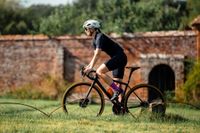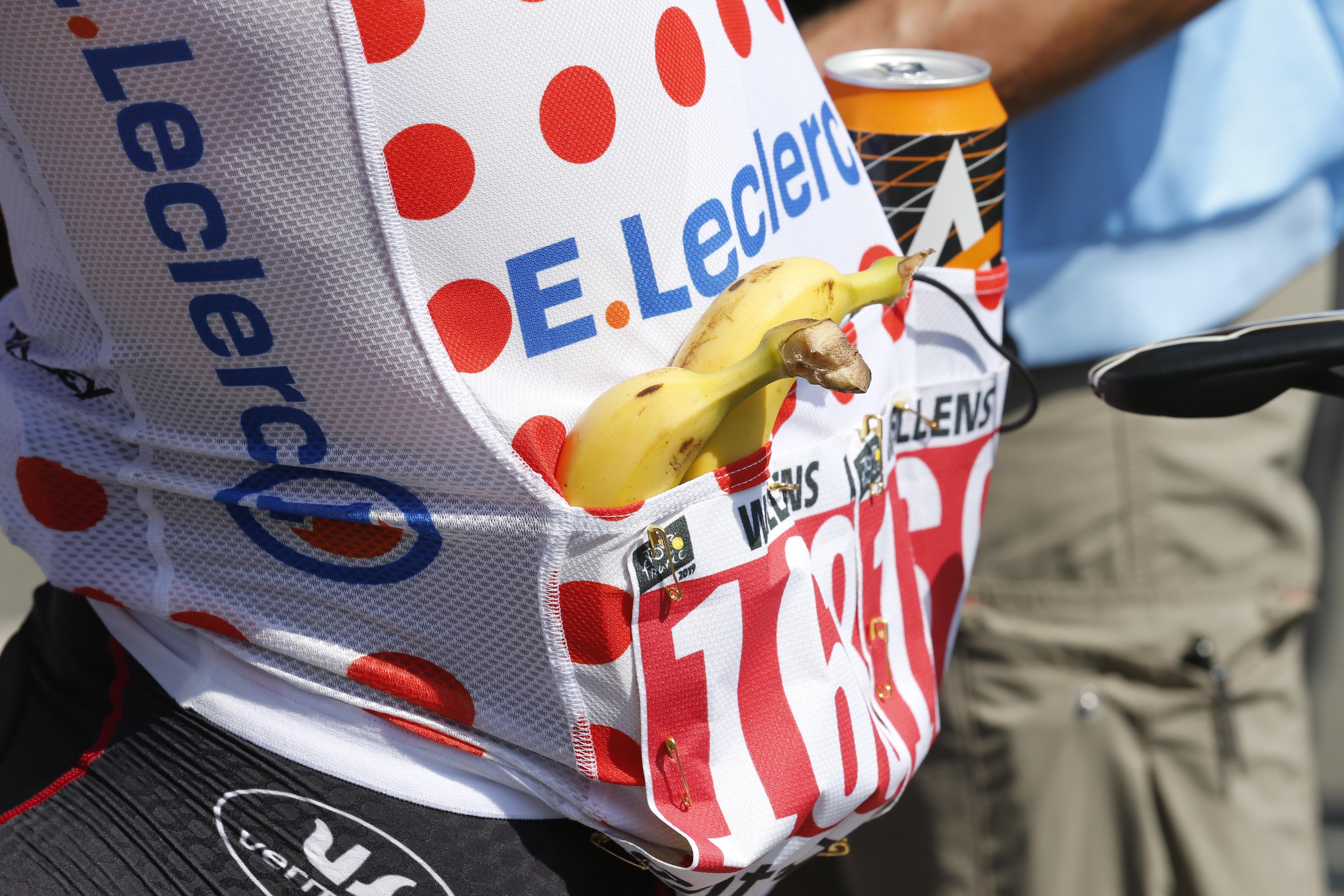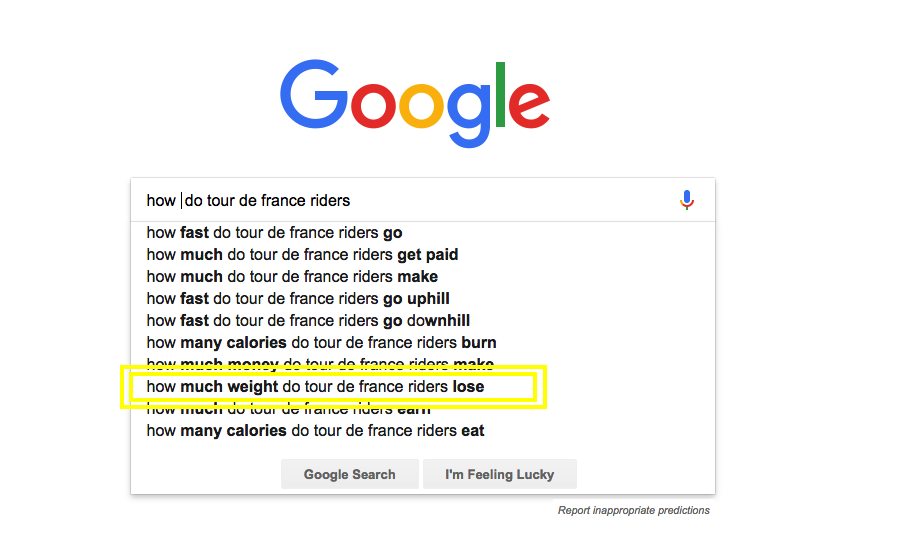How much weight do Tour de France riders lose? – you asked Google and we’ve got the answer
Three weeks of solid riding and more than 3,000km in total - surely that'd be enough to drop a couple of inches on the waist?


The latest race content, interviews, features, reviews and expert buying guides, direct to your inbox!
You are now subscribed
Your newsletter sign-up was successful
The Tour de France - or any three week Grand Tour, for that matter - puts a huge amount of stress on a rider's body.
This year's 21-stage route covers a total of f 3,460 kilometres - so it's understandable that Google's autocomplete tells us that many people out there want to know how much weight the riders will lose over the course of the race.

It certainly is possible to lose weight at a Grand Tour - in fact, publication of meal plans and data from Chris Froome's 2018 Giro d'Italia show he did exactly that, in pursuit of a performance gain.
The eventual GC winner varied his intake from as little as 2,566 calories earlier in the race, to as much as 6,663 calories on key 'attack' days.
Want answers to the others? Try:
- How much prize money will the Tour de France winners make?
- How many calories do Tour de France riders burn?
- How fast do Tour de France riders go downhill?
This year, World Champion Alejandro Valverde revealed he had purposefully dropped his weight ahead of the Route d'Occitanie, to see if his body would respond well to the low weight in preparation for the Tour de France - though he did add that he would gain a little before the race, to aid recovery.
Losing weight in the lead up to the race, or even during a Grand Tour, is not something all experts would recommend.
The latest race content, interviews, features, reviews and expert buying guides, direct to your inbox!
"It is possible for a rider to lose weight over a Grand Tour, but not advisable," explains Sunweb team nutritionist Titia van der Stelt. "In the end energy management over three extreme weeks is one of the most important things. This help you not lose power. With a bad day you can easily lose your spot in the GC."
Instead the team monitors rider weight throughout the year, choosing optimum times when riders might seek to lose weight - more than likely when out of competition.
Even in the weeks leading up to the big race, weight loss would be avoided.
"Usually we make a complete year plan with weight and fat percentage for the entire year based on their performance plan, so as long as a rider follows this plan accordingly there will be no weight loss the last three weeks before a Grand Tour. Or in case of an emergency, the maximum weight loss would be 0.5kg," Van der Stelt explains.
Though calorie burn and intake will vary between individuals, she says the riders use up to 8,000 calories a day - "taking on 10 per cent extra every day, just in case," which can even cause some weight gain.
When a rider is looking to lose weight, care is taken to ensure it doesn't impact training.
"In cases where weight loss is needed we fuel the body for the energy it needs to train and to recover and decrease the remaining energy around it, so it doesn’t influence training or recovery, but still causes weight loss."
Team Sunweb's meal plan at the Tour de France
A recipe for weight loss is to ensure that calorie expenditure is greater than the calories taken on. To maintain it the two must be equal, and to gain weight we need to eat more calories than we burn.
Van der Stelt ensures that Team Sunweb's fuel stores remain well replenished throughout the race. We asked her to detail an average day:
Before the stage

Riders will have a lot of ‘slow’ carbs which release energy over a longer period - such as whole grain bread and oats.
Also three hours before exercise, the riders take a capsule from our premium sports nutrition supplier 'Born', which includes the key ingredient Fruitflow - the rider’s secret weapon to better support recovery. It not only helps blood platelets circulate more freely, but also reduces the inflammation caused by intense and endurance exercise, therefore aiding a faster recovery.
On the bike
Here riders have very quick carbs in the right amounts of glucose and fructose for a maximum uptake - mainly in a form of bars, gels and isotonic drinks.
After the stage

Riders need a mixture of carbs - some quick carbs for recovery such as fruit but also slow carbs such as wholegrain pasta to provide them with energy over a longer period.
Of course after the stage there will also be some protein to rebuild the muscle damage as well. We use for instance PeptoPro protein in our recovery shake, which is a pre-cut protein to improve the recovery time.
But when anyone undertakes an intense or endurance training session, not only do they cause trauma to the muscles used during the exercise but they also cause other types of inflammation in the body that are detrimental.
Exercise releases thrombin and epinephrine - adrenaline - into the blood stream, ‘activating’ blood platelets and causing inflammatory stress, which can slow down the recovery and adaption processes. This can happen in anyone and the effects can last up to 48 hours, which can hinder recovery and thus performance when taking part in multi-day events.
Before bed, the rider's also take a 'Born' drink with casein protein and Fruitflow. Casein is a slow releasing protein for a good recovery overnight and Fruitflow is a natural supplement that reduces the effects of inflammation caused by intense and endurance work.
Michelle Arthurs-Brennan the Editor of Cycling Weekly website. An NCTJ qualified traditional journalist by trade, Michelle began her career working for local newspapers. She's worked within the cycling industry since 2012, and joined the Cycling Weekly team in 2017, having previously been Editor at Total Women's Cycling. Prior to welcoming her first daughter in 2022, Michelle raced on the road, track, and in time trials, and still rides as much as she can - albeit a fair proportion indoors, for now.
Michelle is on maternity leave from April 2025 until spring 2026.
